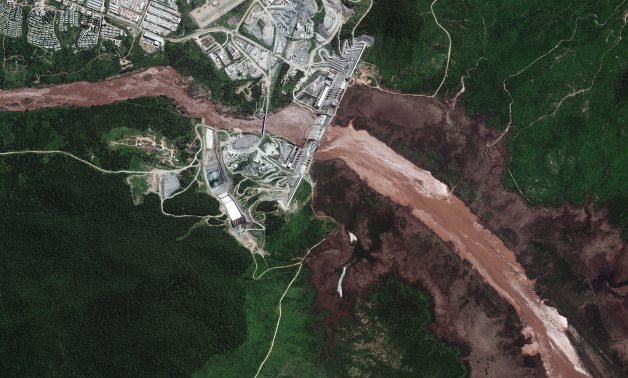
A handout satellite image shows a view of the Grand Ethiopian Renaissance Dam (GERD) and the Blue Nile River in Ethiopia June 26, 2020. Picture taken June 26, 2020. Maxar Technologies via REUTERS
CAIRO – 21 November 2020: Sudan decided not to participate in the tripartite meeting with Egypt and Ethiopia on the controversial issue of the Grand Ethiopian Renaissance Dam (GERD) due to start on Saturday, according to a statement from the Sudanese Ministry of Irrigation and Water Resources on Saturday.
Sudanese Minister of Irrigation and Water Resources Professor Yasser Abbas sent a letter to Minister of Water Resources of Ethiopia Seleshi Bekele, affirming that Sudan calls for giving a greater role to the African Union experts to facilitate negotiation and bring the apartment closer between the three parties.
He added that the method used in the negotiation during the past rounds has proven to be useless, the statement said.
The message reaffirmed Sudan’s stance of adherence the negotiating process under the AU brokerage to reach a binding and satisfactory legal agreement for the three parties.
The latest round of tripartite negotiations between Foreign Ministers and Water Ministers of Egypt, Sudan, and Ethiopia was held virtually on Thursday.
The three countries have conducted several meetings under the brokerage of the African Union (AU) over the last few months, but they reached a stalemate every round they held on the technical and legal points of contention.
Late October, Egyptian Minister of Water Resources and Irrigation Mohamed Abdel-Atti in an interview with “From Cairo” T.V. program on Sky News Arabia said that Ethiopia is responsible for the failure of reaching a comprehensive agreement with the Nile downstream countries [Egypt and Sudan] regarding the operation and the filling of its dam.
The conflict between Egypt, Sudan, and Ethiopia dates back to May 2011 when Ethiopia started building the dam; Egypt voiced concern over its water share [55.5 billion cubic meters]. Three years later, a series of tripartite talks between the two countries along with Sudan began to reach an agreement, while Ethiopia continued the dam construction.
In 2015, the three countries signed the Declaration of Principles, per which the downstream countries should not be negatively affected by the construction of the dam. In October 2019, Egypt blamed Addis Ababa for hindering a final agreement concerning a technical problem, calling for activating Article No. 10 of the Declaration of Principles, which stipulates that if the three countries could not find a solution to these disputes, they have to ask for mediation.
Washington had brokered a tripartite discussion between the three countries, in presence of the President of the World Bank (WB) starting from November 6, 2019 until February 27 and 28, 2020 when Ethiopia apologized for being absent from the negotiations. During these rounds of talks, tangible outcomes were agreed on among the three parties concerning the rules and mechanism of operating the dam and the filling process of the reservoir during the drought and prolonged drought; however, the Ethiopian and Sudanese refused to sign the US/WB-drafted deal.
Comments
Leave a Comment